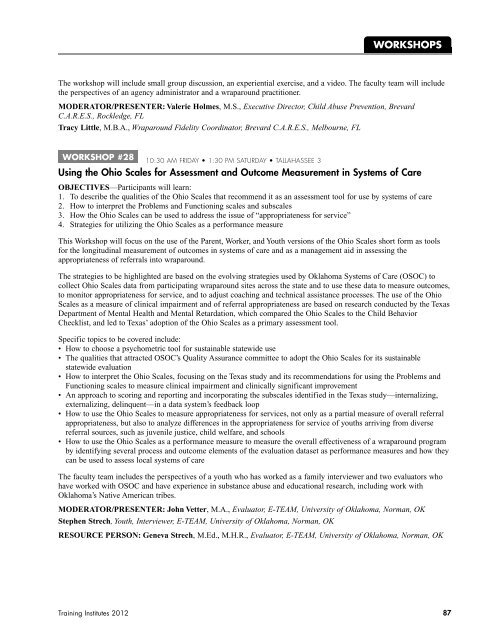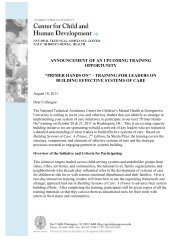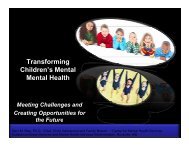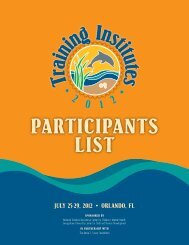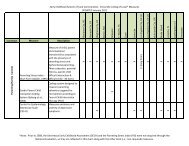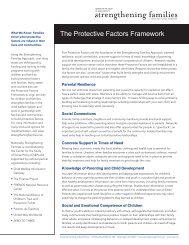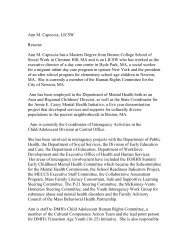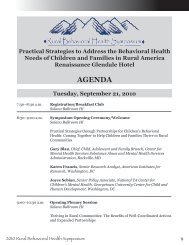Training Institutes 2012 - National Technical Assistance Center for ...
Training Institutes 2012 - National Technical Assistance Center for ...
Training Institutes 2012 - National Technical Assistance Center for ...
You also want an ePaper? Increase the reach of your titles
YUMPU automatically turns print PDFs into web optimized ePapers that Google loves.
The workshop will include small group discussion, an experiential exercise, and a video. The faculty team will include<br />
the perspectives of an agency administrator and a wraparound practitioner.<br />
MODERATOR/PRESENTER: Valerie Holmes, M.S., Executive Director, Child Abuse Prevention, Brevard<br />
C.A.R.E.S., Rockledge, FL<br />
Tracy Little, M.B.A., Wraparound Fidelity Coordinator, Brevard C.A.R.E.S., Melbourne, FL<br />
WORKSHOP #28 10:30 AM FRIDAY • 1:30 PM SATURDAY • TALLAHASSEE 3<br />
Using the Ohio Scales <strong>for</strong> Assessment and Outcome Measurement in Systems of Care<br />
OBJECTIVES—Participants will learn:<br />
1. To describe the qualities of the Ohio Scales that recommend it as an assessment tool <strong>for</strong> use by systems of care<br />
2. How to interpret the Problems and Functioning scales and subscales<br />
3. How the Ohio Scales can be used to address the issue of “appropriateness <strong>for</strong> service”<br />
4. Strategies <strong>for</strong> utilizing the Ohio Scales as a per<strong>for</strong>mance measure<br />
This Workshop will focus on the use of the Parent, Worker, and Youth versions of the Ohio Scales short <strong>for</strong>m as tools<br />
<strong>for</strong> the longitudinal measurement of outcomes in systems of care and as a management aid in assessing the<br />
appropriateness of referrals into wraparound.<br />
The strategies to be highlighted are based on the evolving strategies used by Oklahoma Systems of Care (OSOC) to<br />
collect Ohio Scales data from participating wraparound sites across the state and to use these data to measure outcomes,<br />
to monitor appropriateness <strong>for</strong> service, and to adjust coaching and technical assistance processes. The use of the Ohio<br />
Scales as a measure of clinical impairment and of referral appropriateness are based on research conducted by the Texas<br />
Department of Mental Health and Mental Retardation, which compared the Ohio Scales to the Child Behavior<br />
Checklist, and led to Texas’ adoption of the Ohio Scales as a primary assessment tool.<br />
Specific topics to be covered include:<br />
• How to choose a psychometric tool <strong>for</strong> sustainable statewide use<br />
• The qualities that attracted OSOC’s Quality Assurance committee to adopt the Ohio Scales <strong>for</strong> its sustainable<br />
statewide evaluation<br />
• How to interpret the Ohio Scales, focusing on the Texas study and its recommendations <strong>for</strong> using the Problems and<br />
Functioning scales to measure clinical impairment and clinically significant improvement<br />
• An approach to scoring and reporting and incorporating the subscales identified in the Texas study—internalizing,<br />
externalizing, delinquent—in a data system’s feedback loop<br />
• How to use the Ohio Scales to measure appropriateness <strong>for</strong> services, not only as a partial measure of overall referral<br />
appropriateness, but also to analyze differences in the appropriateness <strong>for</strong> service of youths arriving from diverse<br />
referral sources, such as juvenile justice, child welfare, and schools<br />
• How to use the Ohio Scales as a per<strong>for</strong>mance measure to measure the overall effectiveness of a wraparound program<br />
by identifying several process and outcome elements of the evaluation dataset as per<strong>for</strong>mance measures and how they<br />
can be used to assess local systems of care<br />
The faculty team includes the perspectives of a youth who has worked as a family interviewer and two evaluators who<br />
have worked with OSOC and have experience in substance abuse and educational research, including work with<br />
Oklahoma’s Native American tribes.<br />
MODERATOR/PRESENTER: John Vetter, M.A., Evaluator, E-TEAM, University of Oklahoma, Norman, OK<br />
Stephen Strech, Youth, Interviewer, E-TEAM, University of Oklahoma, Norman, OK<br />
RESOURCE PERSON: Geneva Strech, M.Ed., M.H.R., Evaluator, E-TEAM, University of Oklahoma, Norman, OK<br />
<strong>Training</strong> <strong>Institutes</strong> <strong>2012</strong><br />
WORKSHOPS<br />
87


